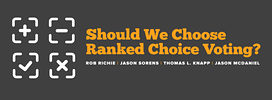Between Rob Richie’s lead essay and the responses from Jason Sorens, Jason McDaniel and myself, the main takeaway I get from this discussion relates less to the virtues or defects of any particular voting method than to its ultimate purpose.
All four of us seem to agree that the technical goal of an election is to reflect, in aggregate but as accurately as possible, the diverse preferences of voters.
Single member districts with first past the post plurality winners don’t do that very well. Even the most lopsided outcome — many U.S. Representatives and U.S. Senators win election after election with 60% or even 80% of votes cast — tends to leave a significant percentage of the electorate unrepresented in its preferences. That’s not even counting those who abstained from voting for reasons other than the apathy usually ascribed to them. The glass gets filled for those who like the winner; it remains empty for everyone else.
Ranked choice voting, approval voting, score voting, and the like all mitigate this problem to a degree. Even if the voter’s most preferred candidate doesn’t win, there’s a decent chance that his second or third choice might, and that his glass will come out half full at any rate. Even as an anarchist, I have to call that a win.
But as an anarchist, I’m also compelled to interject a sentiment expressed by a distinctly non-anarchist historical figure, Abraham Lincoln: “No man is good enough to govern another man without the other’s consent.”
The best way of giving expression to diverse preferences is to take as many matters and decisions as possible out of the hands of government altogether. Politics, including representative democracy, really amounts to some of us telling the rest of us what to do. Put that way, I assume most of us would like to see as little of politics as possible.
In the absence of politically determined mandates and prohibitions, most of us should be able to have our own way most of the time. The exception that lends credibility to political methods is when having our own way constitutes aggression against others. Yes, that is a real problem, but I don’t consider it obvious that politics ever has been, is, or can ever be, an optimal solution to that problem.
I’ve followed experiments in voting method closely for years, and will continue to do so with interest. I do genuinely hope that ranked choice voting makes voters in Maine happier with outcomes. I also hope it makes them more free. If not, well, at least it will add to the body of information we can draw on for purposes of improving (or, says anarchist me, justifying rejection of) American voting and election systems. Either way, as I said before, a win.

